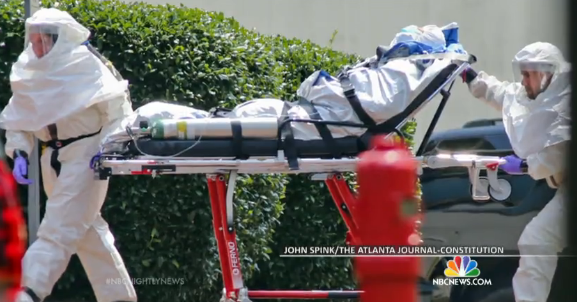US Ebola Patient Nancy Writebol Recovering After Experimental Treatment, But It Will Take Months For Drug To Be Used In Outbreak

Yesterday Nancy Writebol, the second of two Ebola patients to ever receive the experimental serum, was moved from Liberia to a hospital in Atlanta. News reports have come in describing Writebol’s condition as making “slow improvements” toward recovery. This further validates the effectiveness of the serum, but how soon will the drug be available to the masses?
Writebol’s condition is reportedly still “very, very weak, but shows continued, but slow, improvement,” explained Bruce Johnson, the president of Writebol’s aid agency, SIM, HealthDay reported. “She is showing signs of progress and moving in the right direction." Writebol arrived at the Emory University Hospital in Atlanta, Ga., late last night, NBC News reported. It was here that she joined her colleague Dr. Kent Brantly, who had been moved to the secure medical facility only three days earlier. Johnson described Writebol as being strong enough to “stand up and walk with assistance onto the plane,” but needing to be carried into the actual hospital on a stretcher. Her asymptomatic husband is still in Liberia but due to join her in the U.S. shortly.
Both Writebol and Brantly are the first two human recipients of an experimental serum, named ZMapp, created by the San Diego-based pharmaceutical company, Mapp Biopharmaceutical. The serum must be frozen and then allowed to naturally thaw before it can be given to a patient, a process that can take up to eight hours.
The fact that both patients are showing signs of improvement after being ill with a virus known to kill up to 90 of its victims is a promising sign of the serum’s effectiveness. Still, this does not mean the drug will immediately be administered to the hundreds of sick Ebola patients in Africa. After 15 years of research and millions of dollars in support, only a few grams of the serum were created, The Washington Post reported. Administering ZMapp to West Africa is possible, but it is likely to take time and money to produce large enough quantities.
“Maybe they could do it in a month. If they were [already] planning on it, I’m sure they could produce 10,000 doses in a month,” explained Charles Arntzen, a professor at Arizona State University who had collaborated with Mapp Biopharmaceutical for the past 15 years. The director of the National Institute of Allergy and Infectious Diseases at the NIH, Anthony Fauci, agreed, stating that it will be difficult, not impossible, to create more of the serum. “It is not easy to make this serum. … It would take months to produce a significant amount more,” Fauci explained.
More tests are expected to be run on Writebol and Brantly once they recover, to help researchers better understand the exact reasons why the drug worked. For now, Writebol’s family is simply happy to have the 59-year-old hygienist back in the United States and in recovery. "We are tremendously relieved that our mother is back in the U.S.," said Jeremy Writebol, one of Writebol’s two sons, HealthDay reported. "We know that she will receive the best medical care possible at Emory University Hospital."



























